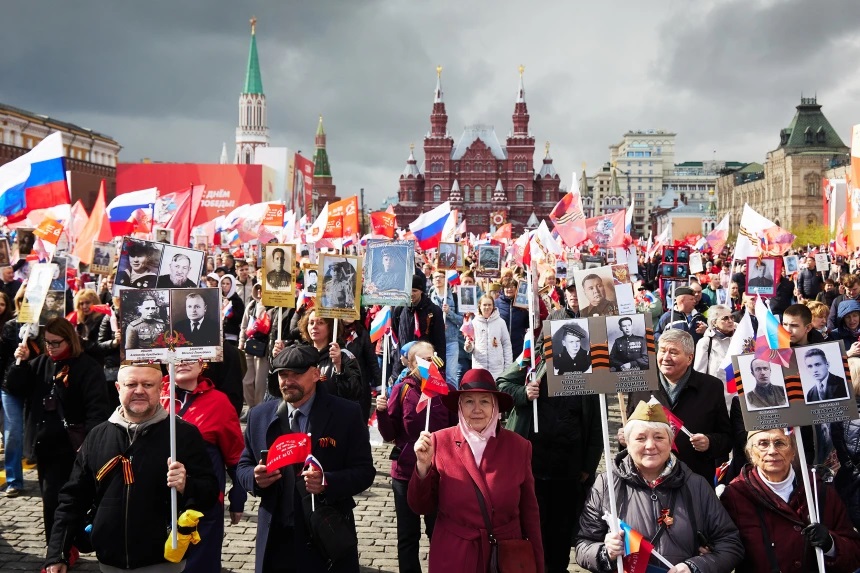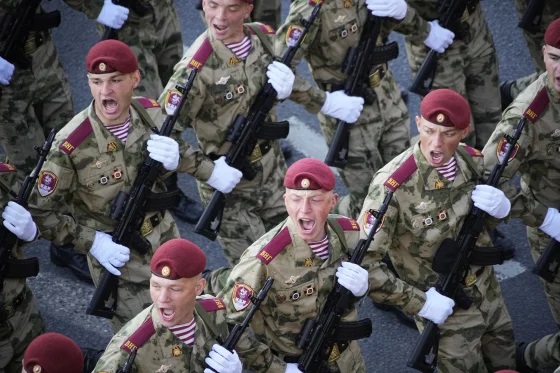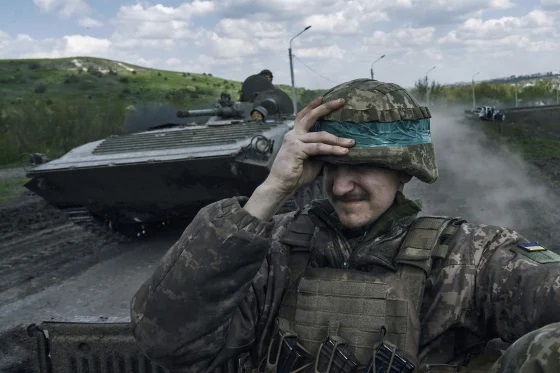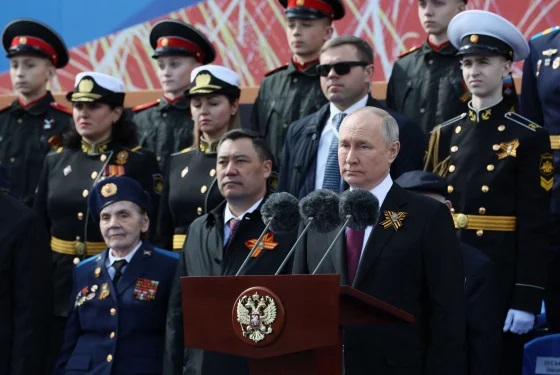Troops paraded through Red Square and President Vladimir Putin exalted his war in Ukraine on Tuesday, but scaled-back celebrations saw Russia’s cherished Victory Day showcase its vulnerability and military weakness, rather than its might.
The country’s annual holiday marking the defeat of Nazi Germany comes nearly 15 months into its own bloody invasion of its neighbor, and just days after an alleged drone attack on the Kremlin, as well as the public escalation of a bitter feud between its top leaders ahead of an anticipated Ukrainian counteroffensive.
Though Kyiv has denied involvement in the mysterious incident and mercenary chief Yevgeny Prigozhin appears to have backtracked on his threat to withdraw from a key battle, the most sacred day on the calendar for Putin’s Russia took place under a growing shadow.
Putin said in his address that “a real war” has been waged on Russia, yet again framing his invasion as a response to the West's "untamed ambitions."
But for all his grandiose language, the high-profile clash over the struggle to capture Bakhmut illustrates the lack of any symbolic victory from a costly winter push on the battlefield. In addition, a wave of explosions have hit strategic targets deep inside Russia and several prominent pro-war figures in recent months, fueling a growing sense of unease over the security of territory Russia controls — from the capital to Crimea.
It prompted authorities in many regions to scale back or cancel military parades that normally draw huge crowds.
Red Square was closed to the public for two weeks ahead of the occasion, in an apparent move to stave off any security threats to the high-profile event in the heart of the capital.
Moscow has also banned the use of civilian drones and ride-sharing services are unavailable in the city center, with security fears given new urgency by what the Kremlin claims was the Ukrainian assassination attempt on Putin.
The “Immortal Regiment” procession, which sees hundreds of thousands of Russians march with the portraits of family members who fought against Nazi Germany every Victory Day, was moved online, with people being asked to share photos of the veterans on social media, buildings and cars instead.
Some activists and analysts have suggested that authorities may also have feared a potent display of the effects of the current war, especially if families brought portraits of the many killed in Ukraine.

Authorities in Crimea have all but canceled Victory Day events “due to security considerations,” according to state media, after a series of apparent Ukrainian drone attacks on military bases and fuel depots in the annexed peninsula that Kyiv is determined to seize back.
“It is better to take precautions,” Kremlin spokesman Dmitry Peskov said Monday, adding that “one way or another, citizens will celebrate this holiday.”
But the war is increasingly being brought home to a population that the Kremlin has worked to insulate from its realities.
“That’s a country clearly on edge,” Michael A. Horowitz, head of intelligence at the Le Beck consultancy, told NBC News on Monday. “When President Putin steps on the podium, everyone will have in mind the image of the drones striking the Kremlin.”
A limited display of pomp and pageantry was still on display in Moscow though, where soldiers are traditionally joined by tanks and missiles for the parade through Red Square.
Putin thanked WWII veterans for “saving humanity from Nazism,” but stuck to his narrative that the war in Ukraine was necessary to prevent an attack on Russia, saying that “a real war has been waged against our Motherland again.”
Kyiv and its Western allies dismiss these claims, seeing Putin’s war in Ukraine as part of his imperialist project to restore Russian prestige and power.
Following a moment of silence, Putin said the safety of Russia and its sovereignty depends on the soldiers fighting in Ukraine, some of whom took part in the parade.
“The whole country has united to support our heroes,” Putin added, a narrative that the Kremlin and state media have tried to promote amid an unprecedented crackdown on opposition to the war.

Since the Soviet era, Victory Day has held tremendous sentimental value for Russians, honoring the sacrifice of 27 million people in the fight against Nazi Germany.
But in the decades of Putin’s rule, the Kremlin has weaponized that memory, using it to demonstrate its military might and send a strong message to its adversaries, rather than focus solely on remembrance.
The black-and-brown ribbon of Saint George, adopted by Russia as a symbol of remembrance nearly 20 years ago, has been used and worn by Russian forces and officials operating in Ukraine.
“Victory Day is central to Putin’s narrative,” Horowitz said. “In the Russian president’s mind, Russia is still engaged in a long battle against ‘Nazism’ that stretches from 1941 (comfortably skipping Russia’s own arrangement with Nazi Germany beforehand), up until today.”
It is a narrative Putin repeated in a bid to rally society behind his “special military operation,” but this is also the second Victory Day that Russia marks without any major victories on the battlefield in Ukraine.
Russian forces have intensified their assault on Ukrainian defenses in the small eastern city of Bakhmut.
It was expected that Russia would want to claim the symbolic victory in time for Victory Day, but fierce opposition and Moscow’s own military shortcomings mean the brutal fight has only added to a sense of frailty that will be hard to avoid amid Tuesday’s celebrations.
“Putin will have nothing to say,” Abbas Gallyamov, a Russian political analyst and former Putin speechwriter who has fled the country, wrote on Telegram ahead of the parade. “There is no victory in sight, and without a victory — what kind of Victory Day is that?”

President Volodymyr Zelenskyy said Monday he had signed a decree to commemorate the defeat of Nazi Germany on May 8, in line with his Western allies. May 9, Zelenskyy said, would be an occasion to mark “Europe Day,” which the countries of the European Union mark as a day of peace and unity on the continent.
The move was swiftly decried in Russia.
“By canceling Victory Day on May 9, he betrayed his ancestors once and for all,” said Russian Foreign Ministry spokesperson Maria Zakharova, while the Moscow-appointed leader of Crimea, Sergei Aksyonov, called it “a vile but expected” decision by Kyiv.
Latest Stories
-
Full text: AG’s statement on ORAL investigation into financial malfeasance at NSA
6 minutes -
Dr. Bernie Asher: The finished work of atonement
38 minutes -
Ghana Party in the Park to mark 20th anniversary with unforgettable celebrations
45 minutes -
State institutions that fail to sign performance contracts will be sanctioned – SIGA boss warns
57 minutes -
Photos: Dagbon Overlord pays courtesy call on Mahama
59 minutes -
When Nigeria becomes great, Africa will be great: A Pan-African perspective on the continent’s destiny
2 hours -
My gov’t will not sideline traditional rulers – Mahama
2 hours -
Anabel Rose takes over Open Mic with In Bloom Experience
2 hours -
Gifty Oware-Mensah used NSS allowance as collateral for GH₵30m loan from ADB – Ayine claims
2 hours -
Irate youth block Samereboi roads over arrest of illegal miners
2 hours -
Ghana’s urban population to grow 2.7% year-on-year over next 10 years
2 hours -
Vola Money launches Remittance-as-a- Service platform to support global money transfers
3 hours -
Asante Gold Chirano Limited awards 31 tertiary scholarships to brilliant but needy students
3 hours -
National FMCG Summit and Awards 2025 ignites future of consumer goods
3 hours -
AUCB and HAEC host innovative 2025 Capstone Projects
3 hours

